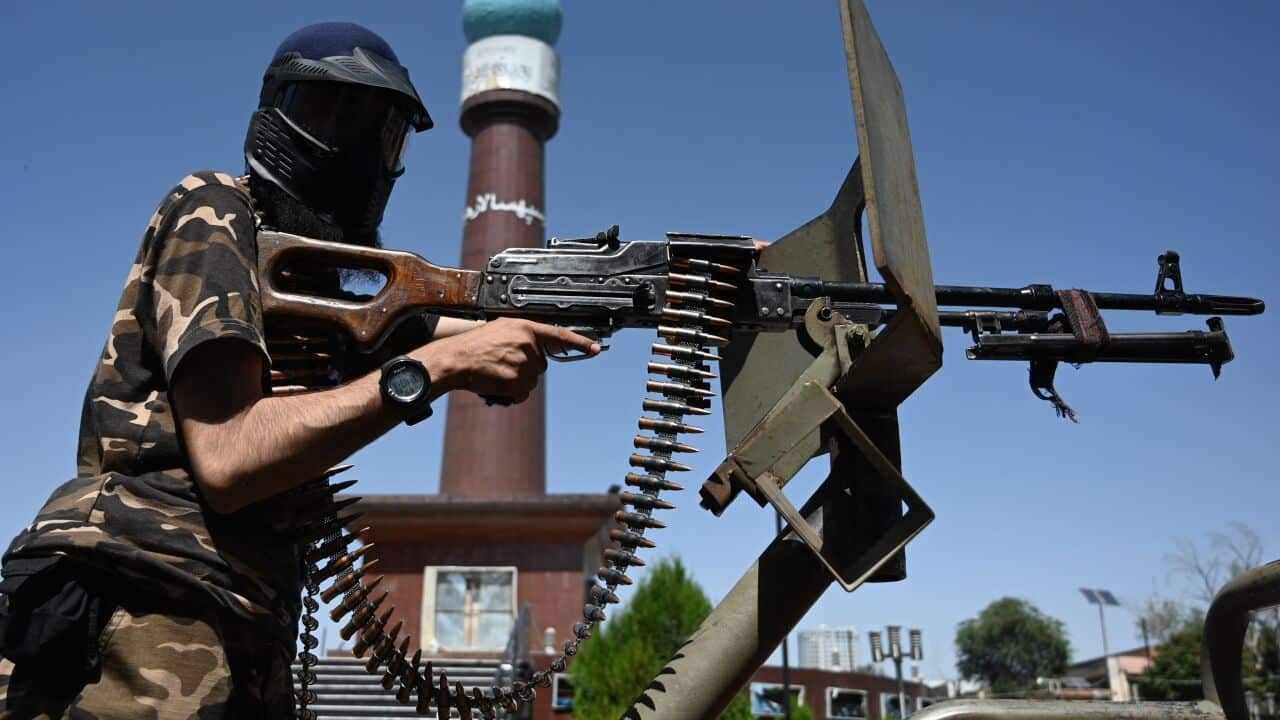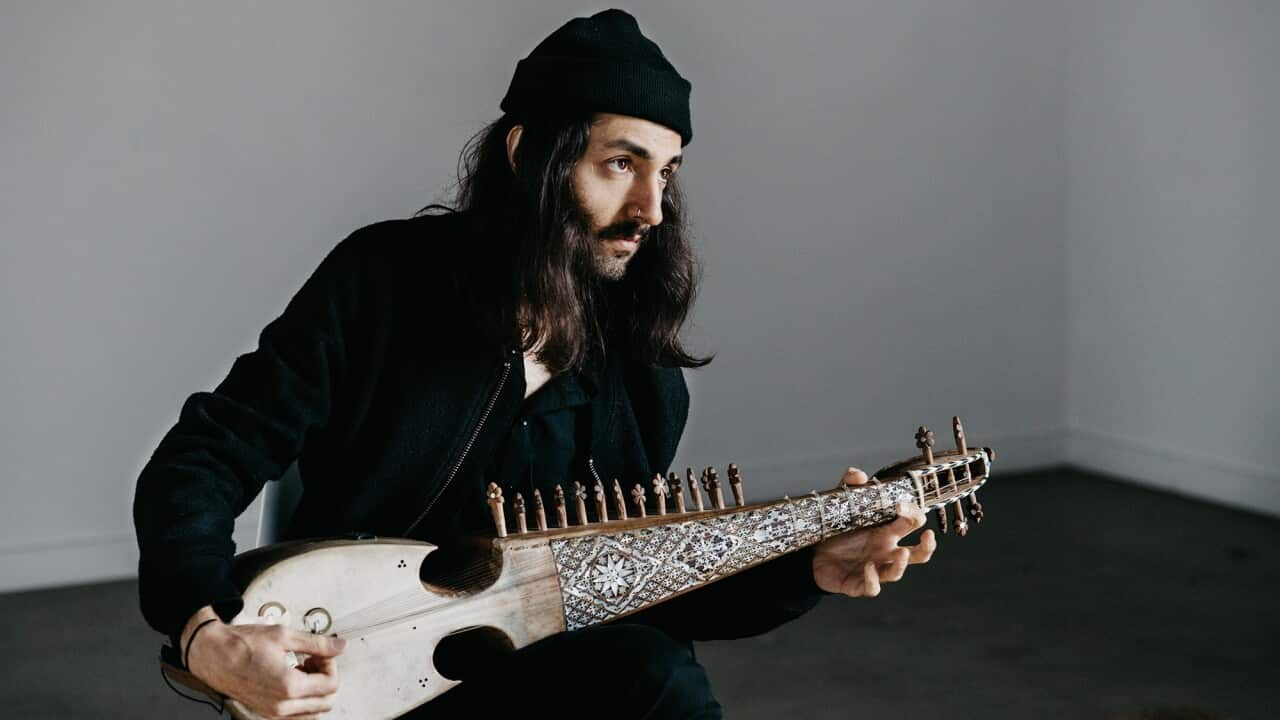Highlights
- Afghans in Australia fear the Taliban's new all-male government was a sign of “history repeating itself” and could lead to civil war.
- 30 of the 33 Taliban appointees were ethnic Pashtuns, while the others were Tajiks and Uzbeks.
- Australia's former acting Afghan ambassador believes the new government was proof the Taliban "have not changed".
Just days before the anniversary of the September 11 attacks, the Taliban declared the restoration of their Islamic Emirate, exclusively
The new administration, formed three weeks after the hard-line Islamist group conquered Kabul, is headed by a UN-blacklisted veteran, Mullah Mohammad Hassan Akhund.
Mullah Yaqoob, the son of the Taliban founder and late supreme leader Mullah Omar, was named defence minister, while the position of the interior minister was given to Sirajuddin Haqqani, the leader of the Haqqani network who the FBI currently offers a reward of up to US$5 million for information leading to his arrest.
Among the 33 people appointed to senior cabinet and security roles, announced by the group’s senior spokesperson Zabihullah Mujahid on Wednesday, 30 are ethnic Pashtuns with only three members from the two other Sunni Muslim ethnic groups, the Tajiks and Uzbeks.
There are no women or members of the predominantly Shia Hazara ethnic group.
‘A horrible allergy to social diversity'
The announcement has been met with widespread criticism and concern among the Afghan diaspora community in Australia and around the world, who warn the Taliban is taking Afghanistan towards another civil war by excluding women and other political forces from the new government.
They say the new administration proves that the group’s hardcore ideology is untacked and has a “primitive” understanding of an inclusive government. “You see, no more was expected of the Taliban, the expectation that was created in the media was based on the same narrative that perhaps the Taliban had changed,” former acting Afghan ambassador in Australia Abbas Farasoo said.
“You see, no more was expected of the Taliban, the expectation that was created in the media was based on the same narrative that perhaps the Taliban had changed,” former acting Afghan ambassador in Australia Abbas Farasoo said.

Mr Farasoo believes the Taliban have a “very horrible allergy” to social diversity. Source: SBS Dari
“The fact is that the Taliban haven’t changed.
“What the Taliban have announced as their cabinet is, in fact, a single identity, single group, and a largely single ethnic group cabinet.
There are no women in this cabinet, there is no one in this cabinet except the Taliban members, there no one in this cabinet except a class of Mullahs and Akhunds.
The Taliban have sought to “humiliate” other major ethnic groups, and this approach, Mr Farasoo said, may lead Afghanistan to more tension and perhaps another civil war.
The current situation in Afghanistan appears similar to what happened after the Soviet withdrawal in 1989 and the US-backed Mujahidin took over the country. In fact, some Afghans describe it as “history repeating itself”.
Like the Taliban, the Mujahidin refused to settle on an inclusive government, and political forces related to different ethnic groups begun fighting amongst themselves in what was often called the “war of all against all”, and finally, the Taliban was formed in the mid-1990s, before seizing power in 1996.
“And, we know that the Taliban have a very horrible allergy to social diversity, to women and to different social strata of Afghanistan,” Mr Farasoo said.
The Taliban send a message that women, the Hazaras to some extent and other major ethnic groups such as the Tajiks and Uzbeks have no place in their government, he said.
“Taliban has an ideological view and bias against the Hazaras and women.” Sydney-based lawyer Shahrnaz Rafi said she was not surprised when she saw the list of the Taliban’s cabinet members, because the group has spent 26 years fighting for a “specific Islamic ideology and brand” that has no room for compromise.
Sydney-based lawyer Shahrnaz Rafi said she was not surprised when she saw the list of the Taliban’s cabinet members, because the group has spent 26 years fighting for a “specific Islamic ideology and brand” that has no room for compromise.

The Taliban’s cabinet list didn’t come as surprise to Shahrnaz Rafi as she believes that this is exactly what they fought for. Source: Supplied/Shahnaz Rafi
The only difference between the current Taliban and that of the 1990s, she said, is that the group now knows how to sell the “new version” of themselves to the media and the West.
“As I said, the result of the ideology that they fought for is today’s cabinet which we see that, unfortunately, is made up of international terrorists and, for example, made up of exclusively one ethnic group,” Ms Rafi said.
“Even if they wanted to, they weren’t able to form an inclusive cabinet that had members of other ethnic groups and women in it, because their advocates and thousands of their followers would have left them and joined other terrorist groups.”
Resistance promises to form its own government
The National Resistance Front of Afghanistan (NRF) headed by Ahmad Massoud, son of the late Panjshir resistance commander Ahmad Shah Massoud, has rebuffed the Taliban’s interim cabinet as “illegal” and a “clear sign of the group’s enmity with the people of Afghanistan,” promising to continue its anti-Taliban struggle.
“Our independent and freedom-loving people, same as they resisted all past forms of totalitarianism, extremism, xenophobia, and the regimes born from them, will continue to resist today until the country is freed from the Taliban and their terrorist allies,” NRF said in a statement. The Panjshir resistance has warned that the Taliban’s regime will pose a threat to the “stability and security” of the region and world, asking the UN, international community, and other independent bodies to “refrain from diplomatic ties” with the group.
The Panjshir resistance has warned that the Taliban’s regime will pose a threat to the “stability and security” of the region and world, asking the UN, international community, and other independent bodies to “refrain from diplomatic ties” with the group.

The young Massoud is leading the “Resistance 2.0” in the Panjshir valley. Source: Reza/Francis DEMANGE/Gamma-Rapho via Getty Images
“NRF will soon make a decision on the future government after consultations with Afghanistan’s important political figures and policy experts,” the statement reads.
Three weeks after seizing Kabul, the Taliban claimed to have conquered the rugged valley on Monday - the last pocket of resistance to their rule.
But the Panjshir resistance has disputed this, saying the Taliban has only entered some parts of the valley.
The struggle continues to exist in Panjshir, and the valley is not totally under the Taliban’s control, head of Ahmad Shah Massoud Foundation in Australia Bilal Waheed Sangy said, adding the Taliban have cut all communication lines that make it hard for the media to access credible information. “The Taliban have access to these things (telephone and internet) and can take a photo or video from every area they reach, publish them, and claim that perhaps we have taken them,” he said.
“The Taliban have access to these things (telephone and internet) and can take a photo or video from every area they reach, publish them, and claim that perhaps we have taken them,” he said.

Mr Sangy says the Panjshir valley is not totally under the Taliban’s control. Source: Supplied/Bilal W Sangy
Several other political groups have previously indicated that if the Taliban refuse to form an inclusive government, they’ll consider joining the resistance forces.
Mr Farasoo said the Taliban’s stance against the will of people and the international community will attract “extensive and heavy sanctions” and the people will be caught in poverty, misery, violence, and repression.
“The Taliban still believe they’re uniting and controlling Afghanistan by force of spear, gun, and violence… this treatment itself leads to humiliation and defeat and leads to internal occupation and a kind of internal colonisation that now also exist.”





